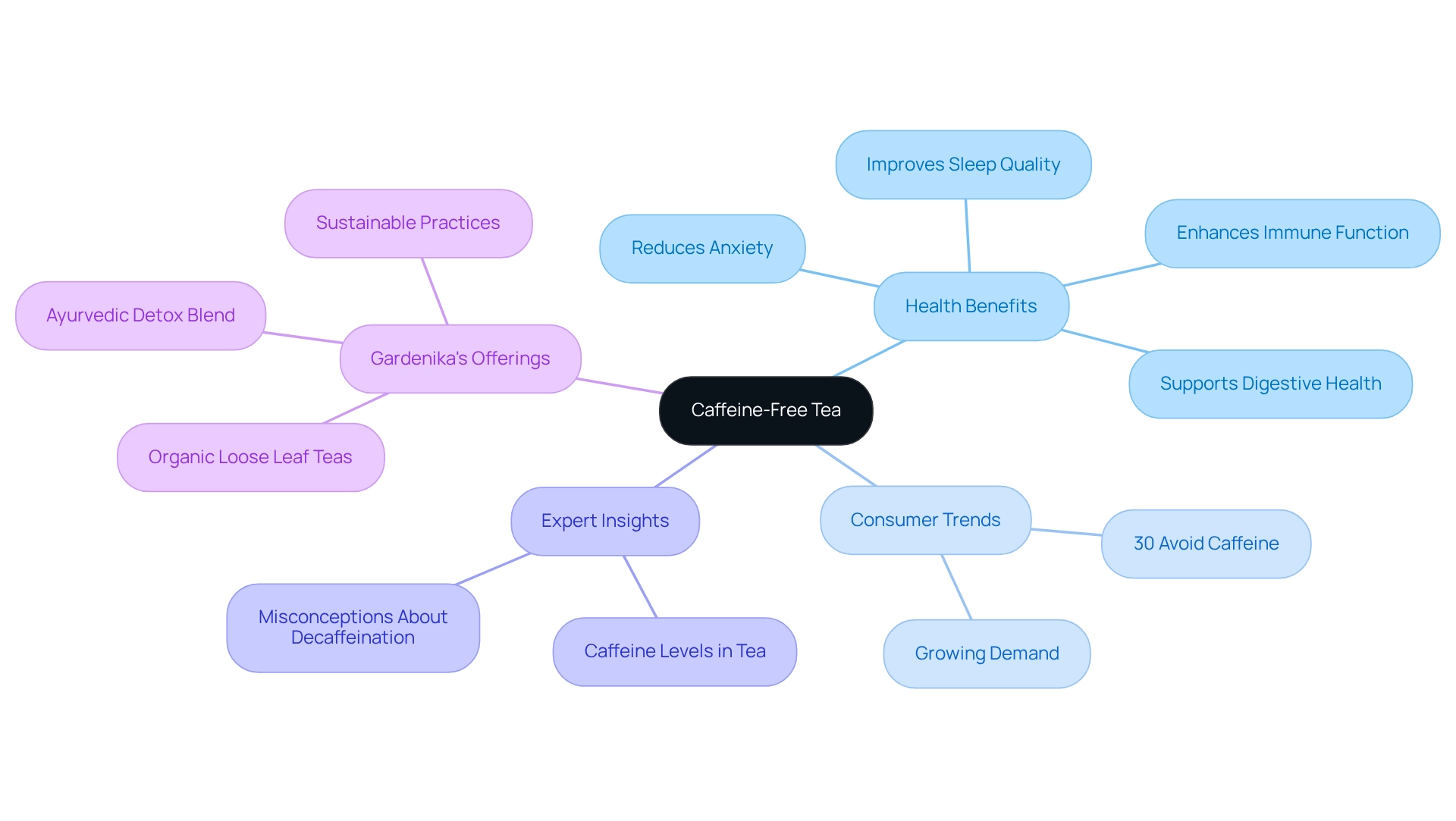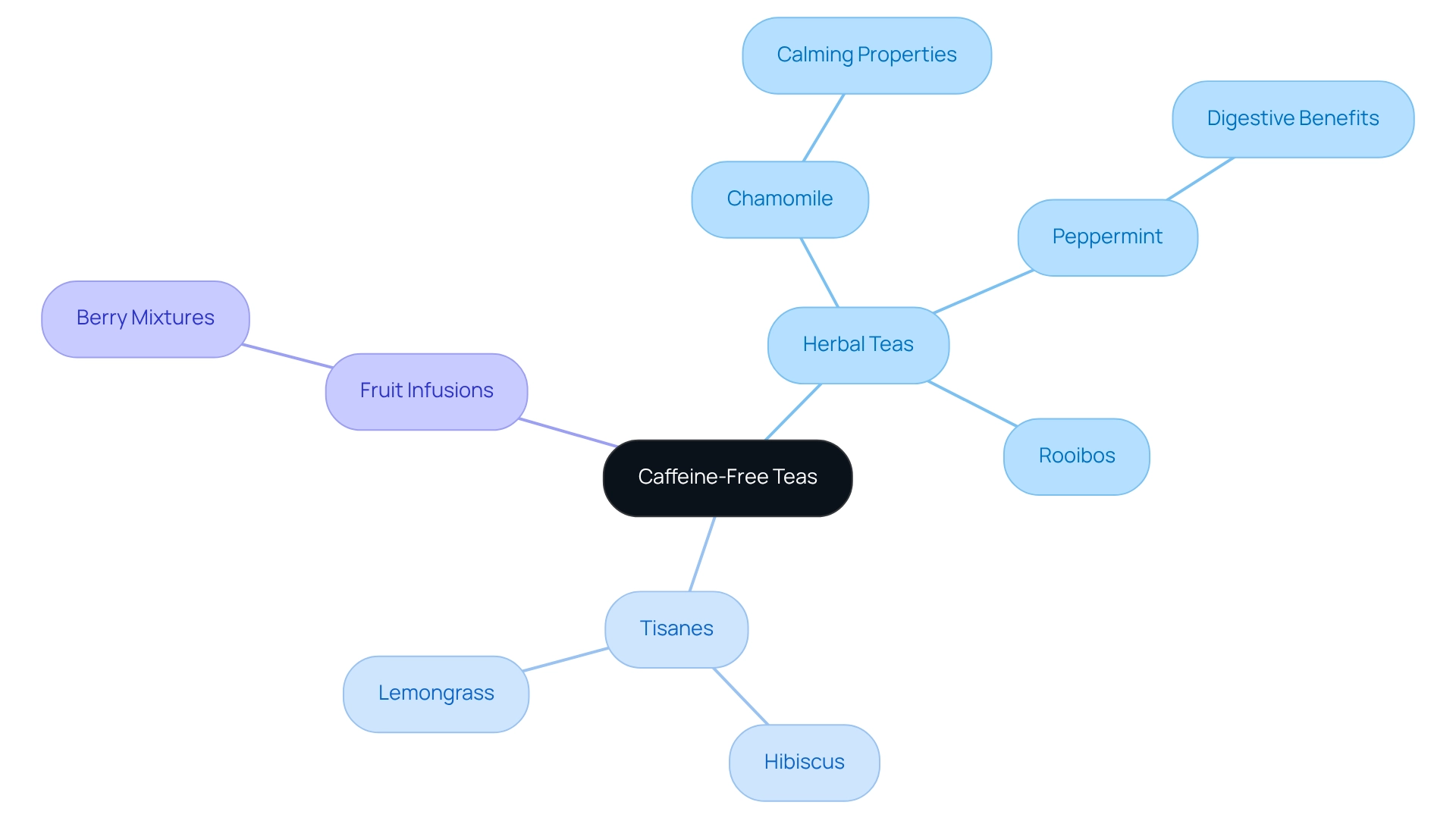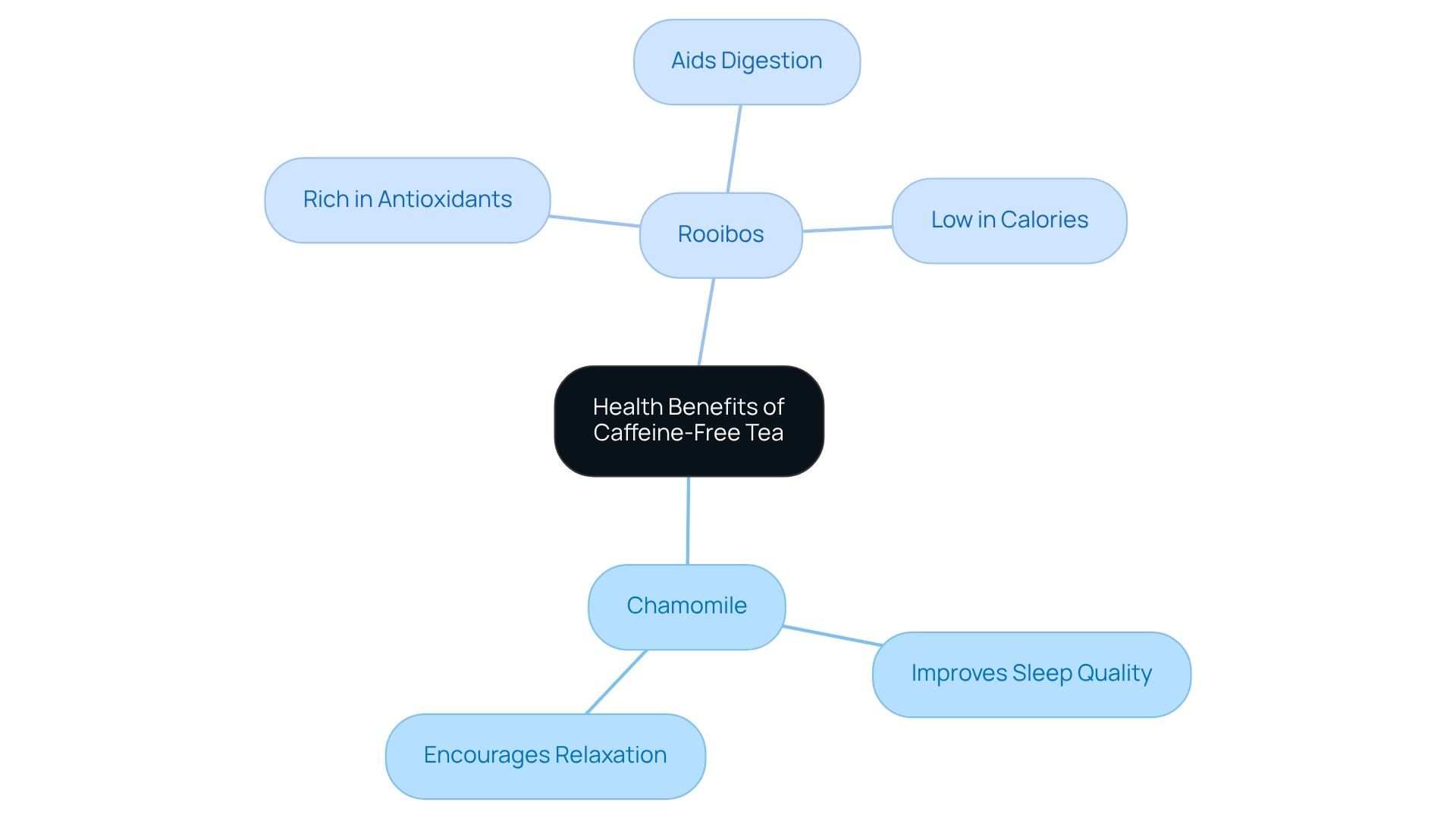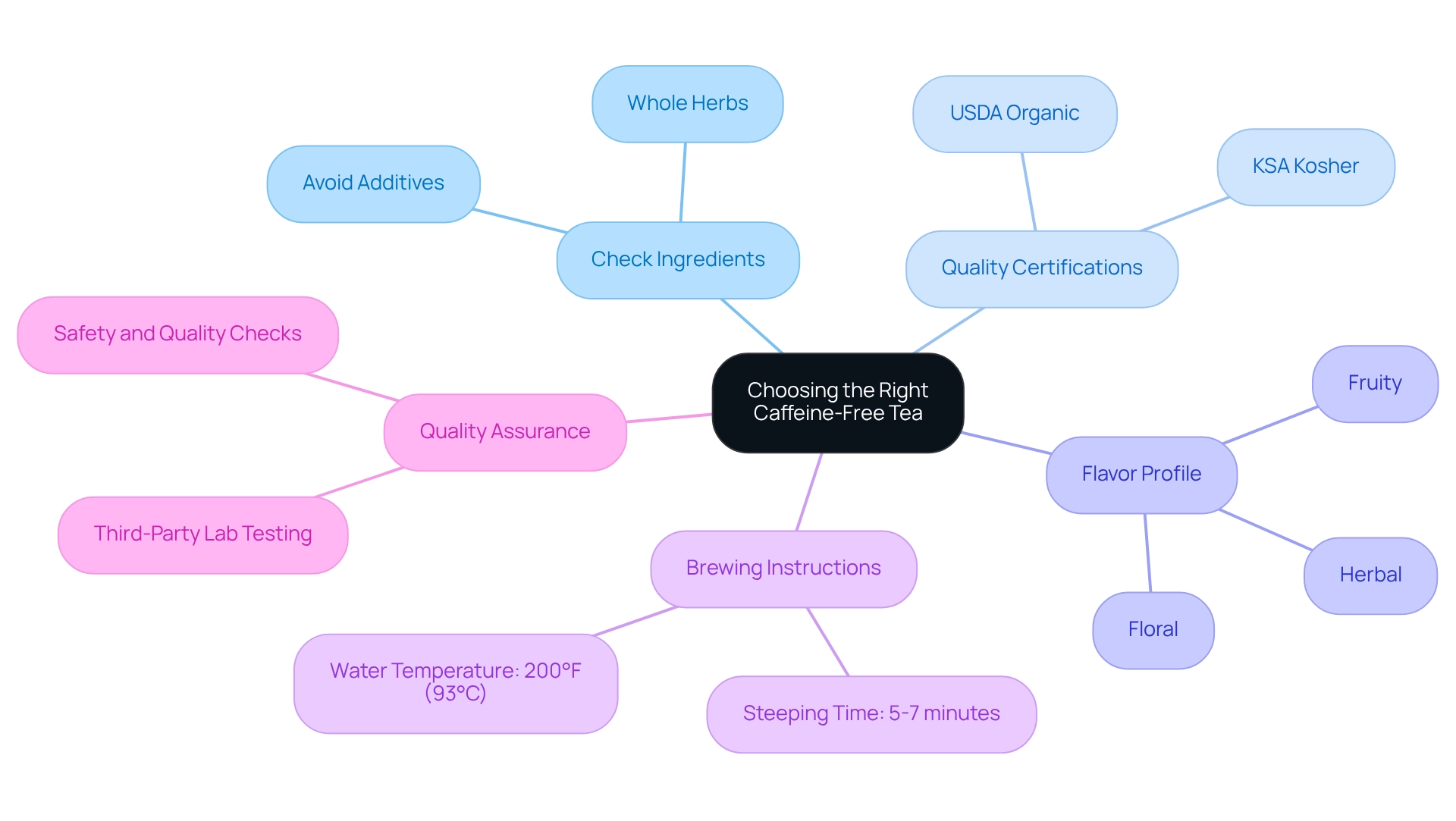What is Caffeine Free Tea? Understanding Its Types and Benefits

Overview
Caffeine-free tea, a delightful choice for those seeking a calming alternative, is crafted from herbal infusions made from various plants, fruits, or flowers that are naturally free from caffeine. These soothing beverages not only offer a gentle respite from daily stresses but also promote relaxation and improve sleep quality. Research and heartfelt testimonials reveal their effectiveness in enhancing overall well-being, making them a cherished part of many wellness journeys.
Imagine curling up with a warm cup of herbal tea after a long day. The comforting aroma envelops you, inviting you to unwind and let go of your worries. Many have found solace in these teas, sharing personal stories of how they’ve transformed their evenings into peaceful rituals. As you explore the world of caffeine-free options, you may discover the perfect blend that resonates with your needs.
In addition to their calming effects, these herbal infusions are often rich in antioxidants and other beneficial compounds, contributing to your overall health. By choosing caffeine-free tea, you’re not just making a beverage choice; you’re embracing a lifestyle that prioritizes your well-being. Why not take a moment to reflect on how these teas could enrich your daily routine?
As you consider incorporating caffeine-free teas into your life, remember that each cup is a step towards nurturing your body and mind. Explore the variety available and find the blend that speaks to you. Your wellness journey deserves this gentle, flavorful companion.
Introduction
In a world that increasingly prioritizes health and wellness, caffeine-free tea has blossomed into a cherished alternative for those wishing to remove stimulants from their diets. These herbal infusions are not just substitutes; they present a delightful array of flavors and impressive health benefits, ranging from promoting relaxation to improving digestive health. As more consumers embrace natural remedies, the market for caffeine-free options is thriving, especially among millennials and health-conscious individuals.
Brands like Gardenika are stepping up to meet this growing demand, making it essential to understand the nuances of caffeine-free tea. This knowledge empowers you to make informed choices that can enhance your overall well-being. Have you ever wondered how the right tea could fit into your wellness journey?
This article explores various types of caffeine-free teas, their health advantages, and offers gentle guidance on selecting the perfect blend to suit your unique tastes and lifestyle. Embrace the journey of discovery and find the tea that resonates with you, nurturing both body and spirit.
Defining Caffeine-Free Tea: What You Need to Know
Caffeine-free tea infusions offer a soothing alternative for those looking to avoid caffeine, a natural stimulant typically found in traditional brews from the Camellia sinensis plant. Instead, these delightful teas are crafted from a variety of herbal ingredients, fruits, or flowers, making them a wonderful choice for anyone seeking a calming beverage. This distinction is particularly significant for individuals wishing to eliminate caffeine from their diets due to concerns like anxiety, insomnia, or heightened sensitivity to stimulants.
Research indicates that around 30% of consumers intentionally avoid caffeine for health reasons, highlighting a growing trend towards caffeine-free options. The advantages of caffeine-free tea extend far beyond just lacking caffeine; these blends can foster relaxation and support overall well-being. For instance, herbal infusions like chamomile and peppermint have been shown to reduce anxiety and improve sleep quality, making them excellent companions for those struggling with insomnia.
At Gardenika, our Organic Loose Leaf Teas, including our Ayurvedic Detox Blend, are thoughtfully created with traditional herbs that not only encourage relaxation but also enhance immune function and digestive health. Our dedication to quality is evident in our USDA Organic and KSA Kosher certifications, ensuring that every cup you enjoy is made from the finest ingredients, sustainably sourced and rigorously tested for purity. Moreover, each batch undergoes third-party lab testing to guarantee safety and quality, allowing you to trust that every sip is pure and reliable.
Expert insights, such as those from Nigel Melican, founder of Teacraft, underscore the importance of understanding caffeine levels in tea. He points out, "You cannot (despite what some notables in the tea industry believe) you just cannot significantly decaffeinate tea by using a 30-second hot water wash..." This statement sheds light on the common misconceptions surrounding caffeine content in various tea types.
Case studies reveal that individuals who incorporate herbal infusions into their daily routines often report significant improvements in their mental and physical well-being. One study found that participants experienced decreased anxiety levels and enhanced sleep patterns after regularly consuming herbal infusions. This aligns with the broader understanding that caffeine-free tea options can serve as effective alternatives for health-conscious consumers seeking natural remedies.
Additionally, research shows that all varieties of this beverage contain approximately comparable caffeine levels, debunking the myth that green options contain less caffeine than black or oolong types. This information is vital for consumers who may be misinformed about the caffeine levels in herbal teas.
In summary, caffeine-free tea not only serves as a safe choice for those avoiding caffeine but also presents a multitude of benefits tailored to the needs of wellness-oriented individuals. By understanding the definition and advantages of herbal tea, consumers can make informed choices that enhance their overall health and lifestyle. Furthermore, Gardenika's commitment to sustainable practices and organic sourcing ensures that our herbal tea options not only support personal wellness but also positively impact the environment.
Shop Now

Exploring the Varieties: Types of Caffeine-Free Teas
Caffeine-free tea offers a diverse range of options, primarily categorized into herbal teas, tisanes, and fruit infusions. Herbal infusions, such as chamomile, peppermint, and rooibos, are crafted from various plants and do not contain traditional leaves, making them naturally free of caffeine. Tisanes, which are herbal infusions, can include delightful ingredients like hibiscus and lemongrass, providing a vibrant array of flavors and potential health benefits.
Fruit infusions, like berry mixtures, present a revitalizing choice for those seeking a naturally sweet and fruity drink. As consumers become more health-conscious, the market for herbal brews has seen substantial growth, with a noticeable shift towards caffeine-free tea as a preferred non-caffeinated option. Herbal infusions have gained a significant share of the overall beverage market, reflecting a broader trend towards natural wellness solutions. Interestingly, green tea consumption surged by 60% in volume over the past decade until 2014, indicating a rising interest in health-focused beverages.
A case-control study in Shanghai revealed the health benefits associated with regular tea consumption, linking green tea to a 32% reduction in pancreatic cancer risk among women. This finding underscores the potential health advantages of herbal varieties as well. Each type of caffeine-free tea offers unique flavors and health benefits, catering to a wide range of consumer preferences. For instance, chamomile is cherished for its calming properties, while peppermint is often sought after for its digestive benefits. The growing popularity of these beverages aligns with an increasing consumer demand for natural solutions that effortlessly fit into daily habits, reinforcing their position in the wellness market.
As buyers become more health-aware, the appeal of caffeine-free tea, along with herbal infusions and tisanes, continues to rise, establishing them as essential items in many households. Our dedication to organic sourcing and environmentally friendly practices enhances the benefits of our products, ensuring that you can enjoy these beverages with confidence in their quality and sustainability. Crafted with time-honored herbs, this organic loose leaf blend brings balance and wellness to your life, supporting your body's natural processes with every sip.
Why not shop now to explore our unique blends? Each is USDA Organic and Kosher certified, promising you a truly healthful experience.

Health Benefits of Caffeine-Free Tea: Why Choose It?
Caffeine-free tea offers a multitude of health advantages, especially in encouraging relaxation, improving sleep quality, and aiding digestion. Imagine discovering harmony with organic loose leaf infusions, crafted with traditional herbs that enhance wellness in your life. Chamomile tea, for example, is widely celebrated for its soothing properties, making it an ideal choice for your evening rituals.
Research has demonstrated that chamomile can greatly enhance sleep quality. Many users note a more restorative night after adding it to their routine. Rooibos tea, another favored option without caffeine from the brand, is rich in antioxidants that assist in fighting oxidative stress and inflammation. Its naturally sweet flavor means you can enjoy it without added sugars, making it a healthier alternative to sugary drinks.
Moreover, rooibos is low in calories, fitting seamlessly with health-conscious dietary preferences. Nutritionists frequently suggest caffeine-free tea for its capacity to encourage relaxation and enhance overall well-being. The wellness advantages of these infusions are linked to their polyphenols and other bioactive substances, which contribute to their soothing effects. Hasan Mukhtar, a notable cancer researcher, observes that tea consumption is linked to the prevention of chronic illnesses and overall well-being.
Authentic testimonials emphasize the transformative influence of these brews. Many people observe enhancements in digestion and relaxation after consistent intake. Alongside their soothing effects, caffeine-free tea infusions from Gardenia are associated with several wellness benefits. For example, studies show that the intake of herbal infusions can result in improved digestive well-being, with numerous individuals finding relief from typical digestive problems. A phase I trial of Polyphenon E established a maximum tolerated dose of 600 mg twice daily, underscoring the antioxidant properties of tea that promote overall well-being.
The advantages of caffeine-free tea infusions are further backed by case studies that examine their effectiveness in encouraging relaxation and assisting digestion, especially when paired with nutritious eating and exercise routines. Opting for caffeine-free tea from a specific brand not only promotes a more wholesome lifestyle but also offers a pleasurable way to relax. With a growing body of evidence underscoring their benefits, these herbal infusions are becoming increasingly popular among those seeking natural solutions for relaxation and health. Why not shop now to discover the balance and wellness that organic loose leaf blends can bring to your life?

Decaffeinated vs. Caffeine-Free: Understanding the Differences
Decaffeinated tea is crafted from traditional tea leaves that have undergone a careful process to remove most of their caffeine content, yet they may still retain trace amounts. This detail is particularly relevant for those who are sensitive to caffeine or prefer to limit their intake. For instance, while decaffeinated black brew can contain small amounts of caffeine, herbal infusions like rooibos are completely devoid of it, making them a wonderful choice for anyone seeking a truly caffeine-free alternative.
At Gardenika, we offer a delightful variety of organic loose leaves blended with traditional herbs that promote wellness and harmony. Each blend is thoughtfully designed to support your body's natural processes, providing relaxation and immune support with every soothing sip. Our Ayurvedic blends are especially noteworthy, as they combine time-honored wisdom with natural ingredients to enhance your overall well-being.
Understanding the differences between decaffeinated and caffeine-free beverages is essential for making informed choices. Decaffeinated beverages are often enjoyed by those who appreciate the flavor characteristics of classic infusions but wish to reduce their caffeine intake. On the other hand, our caffeine-free tea infusions, such as herbal mixtures, come from plants that naturally do not contain caffeine, offering a range of flavors and wellness benefits without the stimulating effects.
As highlighted in Food Research International, "All infusions have roughly similar caffeine contents, and one cannot rely on the belief that green varieties contain less caffeine, as asserted by many popular claims." This insight underscores the importance of understanding caffeine content across different tea types. Additionally, a statistic from the HPFS indicates that higher caffeinated coffee consumption is linked to certain health risks, which may resonate with health-conscious readers reflecting on their caffeine intake.
Consumer experiences reveal the varying preferences for these tea varieties. Many individuals share that transitioning to herbal infusions, such as those offered by Gardenika, has positively impacted their relaxation and overall health, particularly in the evening or before sleep. Expert insights suggest that those with caffeine sensitivity may prefer options without caffeine, allowing them to enjoy the ritual of tea drinking without the jitters or sleep disturbances that can accompany caffeine.
Moreover, awareness of caffeine levels in beverages is rising among consumers. A significant number of tea enthusiasts are now more knowledgeable about the distinctions between decaffeinated and non-caffeinated options, leading to more thoughtful decisions in their tea selections. This shift reflects a broader trend towards health-conscious living, where consumers prioritize wellness and balance in their daily routines.
The parallels drawn from coffee research emphasize the necessity for consumers to remain aware of caffeine content in both beverages, further supporting informed decision-making.
Explore our selection of organic loose leaf infusions today and enjoy the benefits of our Ayurvedic blends for your well-being and relaxation.
Top Caffeine-Free Teas to Try: Recommendations for Every Taste
When exploring caffeine-free organic loose leaf infusions, several standout selections from this brand offer delightful flavors and significant health benefits that can truly enhance your wellness journey:
- Chamomile: Renowned for its calming effects, chamomile infusion is a beloved choice for relaxation. Crafted with time-tested herbs, this chamomile blend supports your body's natural processes, helping to enhance sleep quality and lessen anxiety. Many consumers share their experiences of finding tranquility through chamomile, highlighting its effectiveness in promoting relaxation and overall well-being.
- Rooibos: This naturally sweet and nutty tea is not only delicious but also rich in antioxidants, known for combating oxidative stress. The rooibos blend from the brand serves as a tasty substitute for conventional beverages, appealing to health-aware customers. Research indicates that EGCG, a component found in some teas, may offer protective effects against neurodegenerative disorders, further supporting the advantages of rooibos.
- Peppermint: Known for its refreshing flavor, peppermint tea from the brand is invigorating and aids digestion. Its menthol content can also provide relief from headaches and sinus congestion, making it a versatile option for your wellness toolkit.
- Hibiscus: With its tart and fruity flavor, hibiscus tea is packed with vitamin C and has been linked to lower blood pressure and improved heart health. The hibiscus blend from the brand, with its vibrant color and refreshing taste, makes it a delightful addition to any tea collection.
- Lemon Balm: This aromatic herb is celebrated for its calming effects, ideal for stress relief. Lemon balm tea from a herbal source can help lessen anxiety and encourage relaxation, making it a perfect evening drink.
These organic loose leaf teas not only provide a variety of flavors but also play a significant role in overall wellness. Recent statistics indicate that international sales of herbal tea products have seen a 20% increase year-on-year, reflecting a growing consumer interest in natural wellness solutions. Recommendations from tea sommeliers often include these varieties, underscoring their popularity and health benefits.
Moreover, the Tea Association of the USA notes that more than 87% of Millennials drink tea, highlighting demographic trends in tea consumption. As more individuals seek alternatives to caffeinated beverages, the caffeine-free tea options from Gardenia stand out as excellent choices for enhancing well-being. Why not explore these delightful options today?
Choosing the Right Caffeine-Free Tea: A Guide for Consumers
When selecting caffeine-free teas, it’s essential to consider several key factors to ensure a satisfying and healthful experience:
- Check Ingredients: Prioritize blends that feature whole herbs and natural components. Steering clear of additives that may compromise quality is crucial. At our establishment, we are dedicated to quality, ensuring that each ingredient is meticulously obtained to support your wellness journey.
- Quality Certifications: Look for certifications like USDA Organic, which not only guarantee the absence of harmful chemicals but also reflect a commitment to sustainable practices. Our beverages are USDA Organic and KSA Kosher certified, ensuring their quality and compliance with strict standards.
- Flavor Profile: Choose teas based on your personal taste preferences. Whether you lean towards fruity, floral, or herbal flavors, Gardenia offers a variety of caffeine-free tea options that cater to your palate, including our popular Anti-Inflammatea and Detox blends.
- Brewing Instructions: Following suggested brewing times and temperatures is vital to unlock the complete flavor and wellness advantages of your tea. For optimal results, steep your tea for 5-7 minutes in water heated to 200°F (93°C). Correct brewing can greatly improve your overall experience, enabling you to savor the rich flavors and beneficial qualities of our organic blends.
- Quality Assurance: Every batch of Gardenika tea is third-party lab tested for safety and quality, ensuring that each sip is pure and reliable.
By concentrating on these elements, you can enhance your tea-drinking practices while appreciating the numerous advantages that caffeine-free tea provides. The organic tea market continues to grow, with a projected revenue increase to $135.60 billion by 2024 and a remarkable growth rate of 86.8% as of 2023. This trend underscores the importance of ingredient transparency and quality assurance in your choices, aligning with the preferences of health-conscious individuals seeking natural wellness solutions.
As Pramod Pawar aptly states, "In conclusion, tea is more than just a beverage; it is a cultural icon, a restorative drink, and a source of comfort and pleasure." This perspective highlights the integral role that quality and authenticity play in your tea experience. Explore our offerings today and join our email list to receive an exclusive offer!

The Rise of Caffeine-Free Tea: A Trend Among Health-Conscious Consumers
The desire for caffeine-free tea has blossomed in recent years, reflecting a growing awareness of well-being among consumers. Many individuals are actively seeking alternatives to caffeinated beverages, motivated by concerns over anxiety, sleep disturbances, and overall wellness. This trend resonates particularly with millennials and Gen Z, who prioritize natural and organic products in their dietary choices.
As a result, brands like ours are expanding their offerings to include caffeine-free tea, such as our organic loose leaf infusions crafted from traditional herbs that promote relaxation and immune wellness. This shift indicates a broader transition towards healthier lifestyle options. Why not shop now to discover our unique blends?
Market trends reveal that the caffeine-free tea segment is set for considerable growth, especially in the Asia Pacific region, where wellness concerns are driving demand. Insights suggest that this area is projected to experience significant growth due to the increasing appetite for caffeine-free tea. The global tea market is diversifying, with a notable rise in the popularity of herbal options, particularly caffeine-free varieties.
This change is not merely a response to consumer preferences; it aligns with the increasing focus on wellness and holistic health practices, which Gardenia embodies through our commitment to quality, offering USDA Organic and Kosher certified loose leaf teas.
Demographically, health-conscious consumers opting for caffeine-free tea are becoming increasingly diverse, spanning various age groups and lifestyles. The surge in herbal tea consumption among millennials and Gen Z is particularly noteworthy, as these generations are more inclined to explore natural remedies and seek products that foster relaxation and health. Gardenika's organic blends, such as our calming chamomile and revitalizing peppermint, are thoughtfully designed to meet these needs, providing a soothing experience in every sip.
Case studies illustrate that the market for caffeine-free tea is not only expanding but evolving, with brands innovating to cater to the specific needs of these consumers. The growth rate of the herbal tea market underscores its potential, as more individuals recognize the benefits of incorporating these calming blends into their daily routines. Experts suggest that this trend will continue to gain momentum, establishing herbal tea as a staple for those pursuing balance and wellness in their lives.
As highlighted by a market analyst at Medincell, "We found the results of this study compelling and will help our organization validate a market we are considering entering." This underscores the increasing validation of the caffeine-free tea market as a viable segment for growth, a space where Gardenia is proud to lead with our organic caffeine-free tea offerings.
Conclusion
Caffeine-free tea is more than just a trend; it symbolizes a meaningful shift towards health-conscious living, offering a delightful array of flavors alongside numerous health benefits. From the soothing qualities of chamomile to the rich antioxidants found in rooibos, these herbal infusions provide essential support for relaxation, improved sleep, and digestive health. As the market for caffeine-free options grows, consumers are becoming increasingly aware of the advantages these teas present, empowering them to make informed choices that resonate with their wellness goals.
Understanding the difference between decaffeinated and caffeine-free teas is vital for selecting the right option. While decaffeinated teas may still contain trace amounts of caffeine, caffeine-free varieties are entirely free of stimulants, catering to those who desire a completely caffeine-free experience. Brands like Gardenika are leading the way by offering high-quality, organic loose leaf teas that not only satisfy diverse taste preferences but also uphold stringent quality standards.
As the demand for caffeine-free tea continues to flourish, it reflects a broader cultural movement towards natural remedies and holistic health practices. With millennials and health-conscious consumers at the forefront of this trend, exploring the diverse range of caffeine-free teas can enrich daily routines and enhance overall well-being. Embracing these herbal infusions not only nurtures the body but also fosters a mindful approach to health, making each cup a step towards a more balanced lifestyle. Why not take a moment to explore the world of caffeine-free teas and discover the perfect blend for your journey?
Frequently Asked Questions
What are caffeine-free tea infusions made from?
Caffeine-free tea infusions are crafted from a variety of herbal ingredients, fruits, or flowers, rather than traditional tea leaves from the Camellia sinensis plant.
Why might someone choose to avoid caffeine?
Individuals may choose to avoid caffeine due to concerns like anxiety, insomnia, or heightened sensitivity to stimulants.
What percentage of consumers intentionally avoid caffeine for health reasons?
Research indicates that around 30% of consumers intentionally avoid caffeine for health reasons.
What are some benefits of caffeine-free tea?
Caffeine-free teas can foster relaxation, support overall well-being, reduce anxiety, and improve sleep quality.
What certifications do Gardenika's Organic Loose Leaf Teas have?
Gardenika's teas are USDA Organic and KSA Kosher certified, ensuring high-quality, sustainably sourced ingredients.
How is the caffeine content in tea often misunderstood?
There is a common misconception that green tea contains less caffeine than black or oolong types, but research shows that all varieties have comparable caffeine levels.
What types of caffeine-free tea options are available?
Caffeine-free tea options primarily include herbal teas, tisanes, and fruit infusions, each offering unique flavors and potential health benefits.
What are some examples of herbal infusions and their benefits?
Chamomile is known for its calming properties, while peppermint is often sought after for its digestive benefits.
How has the market for caffeine-free tea changed in recent years?
The market for herbal brews has seen substantial growth, with a noticeable shift towards caffeine-free tea as a preferred non-caffeinated option, reflecting a broader trend toward natural wellness solutions.
What should consumers consider when choosing caffeine-free tea?
Consumers should consider the unique flavors, health benefits, and the quality and sustainability of the products, such as those offered by brands that prioritize organic sourcing and environmentally friendly practices.



